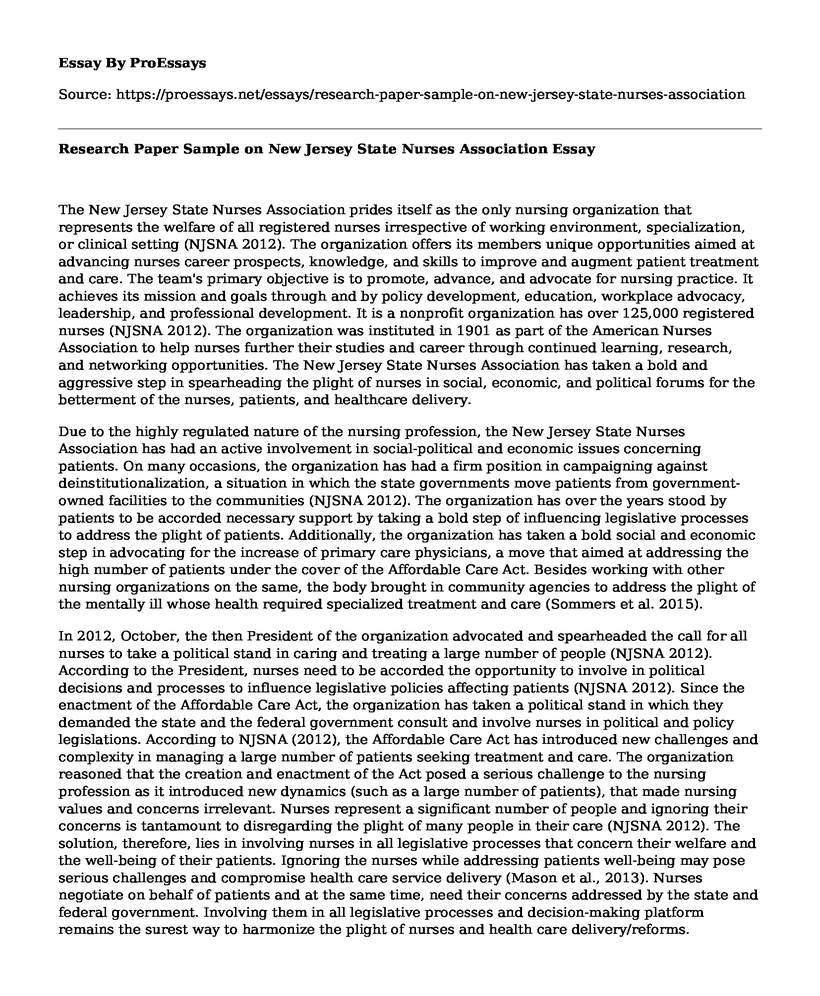The New Jersey State Nurses Association prides itself as the only nursing organization that represents the welfare of all registered nurses irrespective of working environment, specialization, or clinical setting (NJSNA 2012). The organization offers its members unique opportunities aimed at advancing nurses career prospects, knowledge, and skills to improve and augment patient treatment and care. The team's primary objective is to promote, advance, and advocate for nursing practice. It achieves its mission and goals through and by policy development, education, workplace advocacy, leadership, and professional development. It is a nonprofit organization has over 125,000 registered nurses (NJSNA 2012). The organization was instituted in 1901 as part of the American Nurses Association to help nurses further their studies and career through continued learning, research, and networking opportunities. The New Jersey State Nurses Association has taken a bold and aggressive step in spearheading the plight of nurses in social, economic, and political forums for the betterment of the nurses, patients, and healthcare delivery.
Due to the highly regulated nature of the nursing profession, the New Jersey State Nurses Association has had an active involvement in social-political and economic issues concerning patients. On many occasions, the organization has had a firm position in campaigning against deinstitutionalization, a situation in which the state governments move patients from government-owned facilities to the communities (NJSNA 2012). The organization has over the years stood by patients to be accorded necessary support by taking a bold step of influencing legislative processes to address the plight of patients. Additionally, the organization has taken a bold social and economic step in advocating for the increase of primary care physicians, a move that aimed at addressing the high number of patients under the cover of the Affordable Care Act. Besides working with other nursing organizations on the same, the body brought in community agencies to address the plight of the mentally ill whose health required specialized treatment and care (Sommers et al. 2015).
In 2012, October, the then President of the organization advocated and spearheaded the call for all nurses to take a political stand in caring and treating a large number of people (NJSNA 2012). According to the President, nurses need to be accorded the opportunity to involve in political decisions and processes to influence legislative policies affecting patients (NJSNA 2012). Since the enactment of the Affordable Care Act, the organization has taken a political stand in which they demanded the state and the federal government consult and involve nurses in political and policy legislations. According to NJSNA (2012), the Affordable Care Act has introduced new challenges and complexity in managing a large number of patients seeking treatment and care. The organization reasoned that the creation and enactment of the Act posed a serious challenge to the nursing profession as it introduced new dynamics (such as a large number of patients), that made nursing values and concerns irrelevant. Nurses represent a significant number of people and ignoring their concerns is tantamount to disregarding the plight of many people in their care (NJSNA 2012). The solution, therefore, lies in involving nurses in all legislative processes that concern their welfare and the well-being of their patients. Ignoring the nurses while addressing patients well-being may pose serious challenges and compromise health care service delivery (Mason et al., 2013). Nurses negotiate on behalf of patients and at the same time, need their concerns addressed by the state and federal government. Involving them in all legislative processes and decision-making platform remains the surest way to harmonize the plight of nurses and health care delivery/reforms.
References
Cherry, B., & Jacob, S. R. (2016). Contemporary nursing: Issues, trends, & management. New York, NY: Elsevier Health Sciences.
Join NJSNA. (n.d.). Retrieved June 19, 2017, from http://njsna.org/new-jersey-state-nurses-association-welcomes-judith-schmidt-as-new-chief-executive-officer/
Mason, D. J., Leavitt, J. K., & Chaffee, M. W. (2013). Policy and Politics in Nursing and Healthcare-Revised Reprint. New York, NY: Elsevier Health Sciences.
Sommers, B. D., Gunja, M. Z., Finegold, K., & Musco, T. (2015). Changes in self-reported insurance coverage, access to care, and health under the Affordable Care Act. Jama, 314(4), 366-374.
Cite this page
Research Paper Sample on New Jersey State Nurses Association. (2021, Jun 23). Retrieved from https://proessays.net/essays/research-paper-sample-on-new-jersey-state-nurses-association
If you are the original author of this essay and no longer wish to have it published on the ProEssays website, please click below to request its removal:
- Healthcare Systems Management. Critical Thinking Example.
- Acquisition of Healthy Habits Paper Example
- The Process of Budgeting in Nursing Paper Example
- Emergency Management Article Review
- Article Analysis Essay on a Defense of Abortion
- Essay on Learning Disabilities: A Risk for Bullying and Challenges for Identification
- Paper Sample on Social Distancing: An Effective Measure to Fight Coronavirus (COVID-19)







